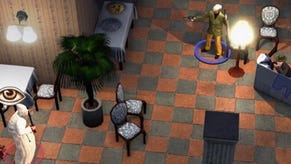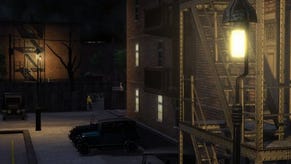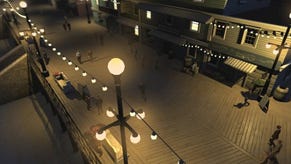Wot I Think: Omerta - City Of Gangsters
A Findus lasagna on your pillow
I'm not a violent man by any means and that should make me very uneasy about my fondness for gangsters, but I far prefer them to other murderous avatars. I'm thinking pirates, ninja, warfighters and bald space marines. That was reason enough to draw my eyes to Omerta: City of Gangsters when it was first announced and I've finally played through the campaign of this city-conquering strategy game. I've already swung a baseball bat at the demo but went deeper into the underground in the hope that I'd find something there worth clinging on to.
As far back as I can remember, I always wanted a sequel to Gangsters. There was a sequel, right, but I don’t remember particularly enjoying it. In fact, I don’t remember particularly enjoying the original game either but the lack of strategic mobster games can lead a man to wring every drop from whatever liquor-stained rag he finds. I’d go back and replay it but my copy is long lost, but if memory serves it wasn’t a bad game so much as an unambitious one that never fully embraced its theme. A snazzy spat worn over a concrete shoe.
Omerta is much the same. There are plenty of things that don't quite work and other things that are entirely against the expected grain. I’ve read the ‘X-COM with gangsters’ line far too often already – I’ve even used it myself, although indirectly – but it holds less water than a prohibition era policeman’s nightcap. There’s a strategic overview and turn-based battles occur, but the scope is much smaller and the city is a balance sheet rather than a living place.
While there is persistence through the campaign, it’s in the form of the gang rather than their holdings. Each new mission takes place in a new part of the city and those streets aren’t simulations. There are cars and people travelling around but they don’t have the personality or professions that caused such attachment to the characters in Tropico. Strip away the actual visual of the city and it’s essentially nothing more than a list of possibilities – vacant joints and premises to take over, active buildings to raid or purchase from, missions to undertake and people to contact.
When I played the demo, I found the management side of the game lacking but that’s at least partly because I expected it to be something that it wasn’t. It’s a hazard of expectation, but the representation of the city in the game and Haemimont’s previous work on Tropico 4 does shore up those expectations rather than redirecting them. A few missions into the campaign, though, Omerta’s systems begin to make a sense of their own.
It’s not really about resource management so much as currency management, since everything produced is spent to buy something else rather than invested in any broader sense. At the base of this there are the two forms of money, dirty and clean, with the latter carrying more weight and available for use in legitimate business, while the former is easier to secure. The most basic gangster economy involves a brewery, which produces beer, and a speakeasy to sell the beer. That brings in a flow of dirty money. When clean money is needed, a friendly city official may be able to launder the filthy luchre, or underworld figures may offer an exchange through the ‘jobs’ screen.
I can only assume it’s called the ‘jobs’ screen to make it sound more appealing in these times of unemployment and struggle because it’s essentially a bulletin’ board. Click on it and you’re taken to a screen containing available ‘swaps’ – firearms for beer, liquor for cash, cash for fear. That last, ‘fear’, is twinned with another stat that measures how well ‘liked’ your gang are. It’s possible to be liked and feared at the same time, but certain businesses will slowly drive up one of the numbers so they tend to be pleasingly lopsided. A well liked leader will find it easier to beg favours and avoid the logistical arm of the law, while a well feared leader will be able to prise every business in a district into his possession much more quickly.
It’s all fairly basic. Need more ‘fear’ to perform the next task in a mission? Click around the city until you find someone who can boost your fear and then procure whatever it is that THEY demand. Sometimes this means setting up pharmacies, casinos or distilleries, sometimes it involves sending the gang into combat. The economic and strategic aspects are simple but function effectively, though not without the occasional oddity that feels like an oversight.
As an example, it’s possible to hold a fire sale, usually when a large shipment has caused storage to overflow and no more warehouse space is available. One mission provided me with a large stash of liquor that I then had to convert into clean money, which meant either setting up legitimate businesses to sell it as medicine or passing it on through the job screen. I quickly noticed that selling the stuff at fire sale prices allowed me to pass the mission, which would have allowed me to skip that entire section of the game.
As for combat, at first it happens at specific points, scripted missions that are fairly uninspiring. Later, failed raids, bank jobs and skirmishes with cops and crooks occasionally lead to the zoomed in tactical map. The most enjoyable element of combat is seeing your gangsters in action, since on the city map they just run about performing tasks almost invisibly. The most you know of them is their limited voiced phrases, which mine the stereotypes, from vamps to drunken Irishmen.
In a fight, all of that changes. Characters have their own weapons, though no inventory, their own special moves and stats that dictate their accuracy, speed and initiative among other things. Cover seems to be important but for some reason, only certain points on each map actually work as cover and sometimes an otherwise intelligent mobster will end up pressed against the wrong side of a pillar, in full view. Movement points and action points are distinct from each other, so it’s possible to use the full allocation of the former and then the latter, so running and gunning is in. Weirdly, action points can’t be reserved for reaction shots, which reduces tactical considerations and emphasises strength and numbers over careful positioning.
Characters don’t die, which is handy because there are a limited supply, and they’re all prebuilt and unlocked at specific points except for the gang leader who is designed at the beginning of the game. The punishment for failure is long-term injuries that reduce stats and possible capture or imprisonment, which then requires expenditure of resources or a rescue mission.
That the management side of the game is so simple, though enjoyable, wouldn’t be too much of a problem if there was more to the tactical combat, but in the end there aren’t enough possibilities in either. It’s not quite a case of a great game with severe drawbacks and more a case of a limited game that somehow manages to keep its head above water for the duration of its campaign.
Both sides of Omerta have flaws and shortcomings that could well be its undoing but, as with Gangsters all those years ago, I found myself enjoying my time in spite of all the problems. If I didn’t enjoy the theme, I’d have been left cold, but while this may not be the strategic gangster game I wanted, it isn’t necessarily an offer to refuse, or indeed an offer of refuse.
If you take the oath knowing that there’s little complexity behind the front and that, particularly in combat, there are systems that are seriously questionable, you’ll likely see the campaign through to the end. Fundamentally, Omerta lacks the one excellent or novel idea that would elevate it. There is a sandbox option but this is the rare occasion when I’ve found a strategy game that requires a tighter mission structure to reign in its mis-steps. That in itself is telling. It’s a game in need of direction and occasionally it provides that but it’ll never have the freedom of the city.
Omerta: City of Gangsters is available now.








